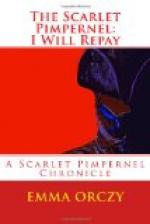A chorus of angry derision greeted this feeble attempt at defence.
“By your own law, Citizen-Deputy Merlin,” commented Tinville sarcastically, “it is a crime against the Republic to be suspected of treason. It is evident, however, that it is quite one thing to frame a law and quite another to obey it.”
“What could I have done?”
“Hark at the innocent!” rejoined Lenoir, with a sneer. “What could he have done? Patriots, friends, brothers, I ask you, what could he have done?”
The giant had pushed the wine cask aside, it rolled away from under him, and in the fulness of his contempt for Merlin and his impotence, he stood up before them all, strong in his indictment against treasonable incapacity.
“I ask you,” he repeated, with a loud oath, “what any patriot would do, what you or I would have done, in the house of a man whom we all know is a traitor to the Republic? Brothers, friends, Citizen-Deputy Merlin found a heap of burn paper in a grate, he found a letter-case which had obviously contained important documents, and he asks us what he could do!”
“Deroulede is too important a man to be tried without proofs. The whole mob of Paris would have turned on us for having arraigned him, for having dared lay hands upon his sacred person.”
“Without proofs? Who said there were no proofs?” queried Lenoir.
“I found the burnt papers and torn letter-case in the woman’s room. She owned that they were love letters, and that she had denounced Deroulede in order to be rid of him.”
“Then let me tell you, Citizen-Deputy Merlin, that a true patriot would have found those papers in Deroulede’s, and not the woman’s room; that in the hands of a faithful servant of the Republic those documents would not all have been destroyed, for he would have ‘found’ one letter addressed to the Widow Capet, which would have proved conclusively that Citizen-Deputy Deroulede was a traitor. That is what a true patriot would have done—what I would have done. Pardi! since Deroulede is so important a personage, since we must all put on kid gloves when we lay hands upon him, then let us fight him with other weapons. Are we aristocrats that we should hesitate to play the part of jackal to this cunning fox? Citizen-Deputy Merlin, are you the son of some ci-devant duke or prince that you dared not forge a document which would bring a traitor to his doom? Nay; let me tell you, friends, that the Republic has no use for curs, and calls him a traitor who allows one of her enemies to remain inviolate through his cowardice, his terror of that intangible and fleeting shadow—the wrath of a Paris mob.”
Thunderous applause greeted this peroration, which had been delivered with an accompaniment of violent gesture and a wealth of obscene epithets, quite beyond the power of the mere chronicler to render. Lenoir had a harsh, strident voice, very high pitched, and he spoke with a broad, provincial accent, somewhat difficult to locate, but quite unlike the hoarse, guttural tones of the low-class Parisian. His enthusiasm made him seem impressive. He looked, in his ragged, dust-stained clothes, the very personification of the squalid herd which had driven culture, art, refinement to the scaffold in order to make way for sordid vice, and satisfied lusts of hate.




